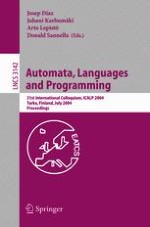2004 | OriginalPaper | Buchkapitel
Linear-Time List Decoding in Error-Free Settings
verfasst von : Venkatesan Guruswami, Piotr Indyk
Erschienen in: Automata, Languages and Programming
Verlag: Springer Berlin Heidelberg
Enthalten in: Professional Book Archive
Aktivieren Sie unsere intelligente Suche, um passende Fachinhalte oder Patente zu finden.
Wählen Sie Textabschnitte aus um mit Künstlicher Intelligenz passenden Patente zu finden. powered by
Markieren Sie Textabschnitte, um KI-gestützt weitere passende Inhalte zu finden. powered by
This paper is motivated by the program of constructing list-decodable codes with linear-time encoding and decoding algorithms with rate comparable to or even matching the rate achieved by the best constructions with polynomial encoding/decoding complexity. We achieve this for three basic settings of list decoding, and view these as the first promising steps in the above general program.First is a setting, which we call “mixture recovering”, where for each position, the symbols of ℓ codewords are given in a scrambled order, and the goal is to recover each of the ℓ codewords. This was one of the first models studied by Ar et al in their influential paper [5] and they gave a polynomial time solution with rate 1/ℓ using Reed-Solomon codes. We propose an elegant expander-based construction with rate Ω(1/ℓ) with linear-time encoding/decoding complexity.Second is the setting of “list-recovering” where the input is a set of ℓ possibilities for the value at each coordinate of the codeword and the goal is to find all the consistent codewords. We give an explicit linear-time encodable/decodable construction which achieves rate that is polynomial in 1/ℓ (the best rate known for polynomial decoding complexity is Ω(1/ℓ)).Third is the setting of decoding from erasures where a certain fraction of the symbols are erased and the rest are received intact. Here, for every ε > 0, we present an explicit construction of binary codes of rate Ω(ε2 log − − O(1)(1/ε)) which can be encoded and list decoded from a fraction (1–ε) of erasures in linear time. This comes very close to the best known rate of Ω(ε2) for polynomial decoding complexity. For codes over larger alphabets, we can even approach the optimal rate of Ω(ε) with linear time algorithms — specifically, we give linear-time list decodable codes of rate $\tilde{\Omega}(\varepsilon^{1+1/a})$ over alphabet size 2a to recover from a fraction (1–ε) of erasures.
